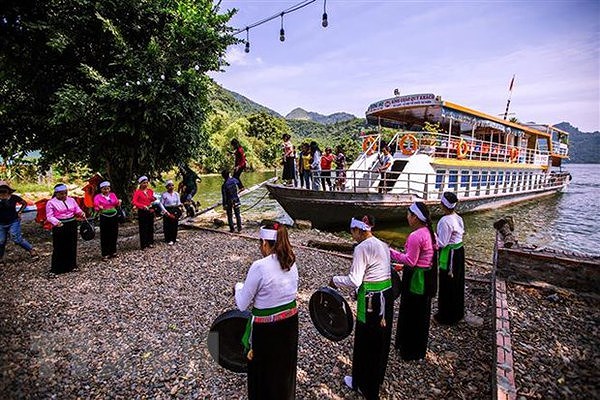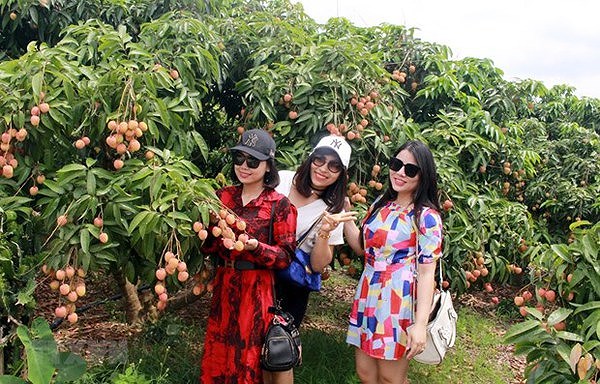The northern province of Bac Giang will facilitate the development of 18 community-based tourism sites in the 2020-2025 period, according to the provincial Department of Culture, Sports and Tourism.
 People stage a performance with traditional musical instruments to welcome tourists (Photo: VNA)
People stage a performance with traditional musical instruments to welcome tourists (Photo: VNA) The northern province of Bac Giang will facilitate the development of 18 community-based tourism sites in the 2020-2025 period, according to the provincial Department of Culture, Sports and Tourism.
The move aims to conserve and bolster local cultural values and capitalise on the potential of tourism and local landscapes as well as improve people’s education, alleviate poverty and hunger, create jobs, and attract more tourists.
Co-operatives in the field will be established, which will specialise in homestay management, cooking, musical performances, tour guides, environmentally-hygienic and traditional crafts, and more.
The sites include three in Na O village and An Lac commune in Son Dong district, as well as in the Mau residential area in Tay Yen Tu township and Dong Cao village in Phuc Son commune.
Yen The district will receive assistance for three facilities in the villages of Ven, Xoan, and Thuong Dong in Xuan Luong commune, and Viet Yen district in one facility in Van Ha commune’s Tho Ha village.
Also receiving assistance is Khe Nghe village in Luc Son and Da Huc in Binh Son in Luc Nam district.
Nine tourism sites in Luc Ngan district will be developed alongside fruit orchards in the communes of Quy Son, Tru Huu, Thanh Hai, Tan Moc, My An, Son Hai, Tan Sơn, Cam Son, and Ho Dap.
Each community-based tourism site is expected to generate jobs for about 500 local residents, helping raise incomes via tourism activities.
 Tourists pose for a photo at a lychee orchard (Photo: VNA)
Tourists pose for a photo at a lychee orchard (Photo: VNA)
Bac Giang has set a target of community-based tourism sites and orchards being capable of welcoming at least 1 million holidaymakers a year by 2025, including 10,000 foreigners. Tourism revenue is expected to hit 450 billion VND (19.57 million USD) at that time.
To foster the development of community-based tourism and meet tourists’ demand, the province will arrange training courses in communications, reception, cooking, and art performance skills, and fact-finding trips for local people engaged in such work to learn from effective and outstanding models.
Bac Giang has also called upon local agencies to bolster studies, create and connect tours, especially those to community-based tourism sites, with tourism companies in the province and other localities, and attract investment in villages that boast substantial potential.
Furthermore, local authorities have earmarked funding for the tourism sites to improve their infrastructure, build signposts, purchase life buoys, and repair communal houses and latrines, among other things.
The tourism sites will be subject to thorough planning to attract visitors and create typical tourism products.
In a bid to bolster the development of its tourism sector, Bac Giang has carried out a community-based tourism project since 2014. During the 2014 - 2020 period, it worked to set up tourism sites in Son Dong, Yen The, and Luc Ngan districts.
Seven households have taken part in the project in Na O village in An Lac commune, Son Dong district, while a communal house was also built, welcoming about 18,000 tourists annually.
Ven village in Yen The district is now home to the Than Truong co-operative, with 20 member households. A stilt-house favoured by many tourists greets around 50,000 holidaymakers each year.
Orchards in Luc Ngan district also welcome significant numbers of tourists, especially when lychees, oranges, and pomelos are in season, with an annual average of 300,000 people.
Famous for its large area of lychees, the district has set up a number of locations in the communes of Quy Son, Hong Giang, and Thanh Hai that are favourable for agritourism.
Challenges remain relating to a lack of infrastructure investment, most notably in electricity, accommodation, and latrines. Services management and operations are matters of concern for local authorities, while community-based tourism sites are yet to create many attractive tourist products./.